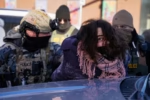Border restrictions and questioning by Serbian authorities of individuals from Kosovo are becoming increasingly common, not only for those of Albanian ethnicity.
Rada Trajković, an adviser to the Minister for Communities and Returns in the Kosovo government, is among those frequently detained by the Serbian police.
“Serbs often say we are not free to go to our birth village because someone might arrest us at Merdare and accuse us. On the other hand, many Albanians and their diaspora will now feel completely insecure traveling through Serbia. If this was the goal and commitment of negotiators to create such an atmosphere, then we now have something contrary to reconciliation and relaxation of relations,” said Rada Trajković, an adviser at the Ministry for Communities and Returns.
The official stance from Belgrade justifies such detentions and arrests as security checks, but besides Albanians, it also targets Serbs working in Kosovo’s institutions who do not align with the Serbian List’s positions and the Serbian authorities.
Observers see these detentions as a form of retaliation following recent developments in the Council of Europe regarding Kosovo.
“It is absolutely undiplomatic, non-political, and inhumane behavior. This is being done purposefully with the arrests of policemen and the deputy commander of the Kosovo Police, who is Serbian, because they want to say, ‘Here, we are arresting the traitor.’ This is something shameful for a country. This is how Serbia behaves. We have reached a moral and political low. I believe the West sees this,” said Zlatoye Martinov, a publicist.
Although there have been reactions from some Western states and the US State Department, few believe that such calls from the West will yield results, warning of the possibility that Serbia’s undiplomatic moves may continue.







